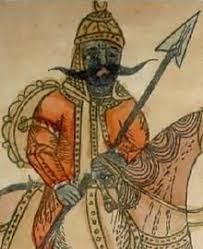|
One of the most well-known and respected figures of the Arabian world, Antarah ibn Shaddad was literally considered one of the seven prolific poets of pre-Islamic era. Antarah was born in 525 AD in the Saudi Arabian region of Najd to parents Shaddād al-ʿAbsī and Zabiba. His father Shaddad al-Absi was a great warrior of the tribe of Banu Abs, his mother Zabiba was an Ethiopian slave of his father Shaddad al-Absi. Zabiba was said to be a princess captured when Shaddad and his tribe raided Ethiopia. Antara was initially rejected by his father because his mother was in servitude, in turn Antara grew up as a slave; because of his dark skin he was considered a “Black Crow.” Antara first began to improve his reputation by his displaying his excellent skills as a poet and a soldier. Antara was in love with a woman named Ablah who was said to be his cousin, his only issue was a slave could not marry. Because of his skill in battle his father Shaddad offered him a position as within the warrior class of the Abs, Antara replied to his father “the slave doesn’t know how to invade or how to defend, but is only good for milking goats and serving his masters”. His father replied to him: “Defend your tribe, O ʿAntar, and you are free”. With the promise of freedom Antara joined the warriors and led them to battle against the invaders. He gained his freedom then looked to make Ablah his wife, but before he could make her his bride he would have to face a number of challenges, his most famous challenge was capturing a special camel from the northern Arab kingdom of the Lakhmids. Antarah was also famous for participating in a battle between Abs and Dhubyans called the Great War of Dahis and Ghabra. Antara is said to have died in a battle against the tribe of Tai around 608 AD. Following the death of Antarah his poetry was curated and he became known as one of the great Arabian poets; one of his poems was included within the Mu’allaqat. The Mu’allaqat is a group of seven extensive poems which are regarded the best poetry of the pre-Islamic era. The name Mu’allaqat means “The Hanging Poems” because the poems were literally hung on or in the Ka’ba of Mecca. Antarah’s poetry is renowned because of how detailed he is in his descriptions of events within his poems. The story of Antarah and Ablah became an epic poetic story said to be written by a poet named al-asma i. One of the seven clans of Bethlehem was named after Antarah called the Anatreh. The Russian composer Nikolai Rimsky-Korsakov based his Symphony Number: 2 after the legend of Antarah. The Arabic poem Antara was translated by the French painter Étienne Dine and was followed by other versions of the work. The story of Antarah even inspired Palestinian operas and became popular within the Western world. He faced adversity early in life but literally fought to change his life, the life of his mother and wife. Antarah ibn Shaddad, we proudly stand on your shoulders. J.A. Ward References:
https://en.wikipedia.org/wiki/Antarah_ibn_Shaddad https://www.poemhunter.com/antarah-antar-ibn-shaddad/biography/ https://en.wikipedia.org/wiki/Mu%27allaqat
0 Comments
Leave a Reply. |
Details
Categories
All
Click Here to join our mailing list
|
Contact Us: |
Connect With Us |
Site powered by PIT Web Design


 RSS Feed
RSS Feed



